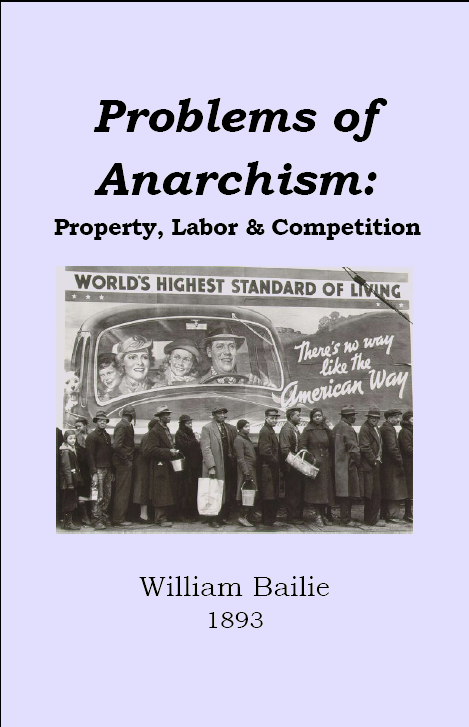tl;dr. Four more beautiful new booklets are now available for ordering from the ALL Distro — July and Augst’s Market Anarchy zines, with articles on corporate power and privatization — and July and August’s Anarchist Classics, including a lost classic on Individualist property theory from the pages of Liberty, and a very popular, but very hard to find classic from Lysander Spooner. You can get one free sample copy of either series (or both) to check out, if you're considering a monthly subscription for individual copies or monthly packs to distribute in the radical space of your choice. Sound good? Contact me for details.
Scatter tracts, like randrops, over the land….
–William Lloyd Garrison, The Liberator, March 1831.
To-day, I’m happy to announce this month’s two additions to the Alliance of the Libertarian Left Artwork & Agitprop Distro. In fact, to-day’s announcement is a twofer: as I mentioned in my teaser post earlier there are also a couple of important pieces that came out in July, and were shipped on schedule to subscribers; and now, with a cross-country move and some general nonsense with the Distro’s Internet connection all, apparently, behind me, I can also happily put out the full official announcement for those two. So, then, let us welcome No. 21 of the monthly Market Anarchy Zine Series, the talk that Benjamin Tucker gave before the assembled academics, industrialists, and bigwigs at the Conference on Trusts of the Chicago Civic Federation, on the trust problem, corporate power, and market freedom; No. 22 of the monthly Market Anarchy Zine Series, a short adaptation of an article by Charles Johnson (yeah, me) on the gap between neoliberal privatization
and free-market radicalism; and two hard-to-find (until now) individualist classics: No. 9 in the Anarchist Classics Series being an ambitious definition and defense of Individualist property theory by William Bailie, originally serialized in the pages of Liberty which to my knowledge has never before been collected or made available in pamphlet form; and No. 10 in the Anarchist Classics Series being a classic by an Anonymous author, now known to be our own Lysander Spooner, which — in spite of having become one of Spooner’s most popular essays! — has been almost impossible to find in print. Thus:
|
|
The classic Market Anarchist take on corporate power and the political privileges that prop it up — Tucker’s talk at the Conference on Trusts by the Chicago Civic Federation in September 1899.
The trusts, instead of growing out of competition, as is so generally supposed, have been made possible only by the absence of competition, only by the difficulty of competition, only by the obstacles placed in the way of competition . . . by those arbitrary limitations of competition which we find in those lawcreated privileges and monopolies . . . . The trusts owe their power to vast accumulation and concentration of wealth . . . But for interest, rent, and monopolistic profit . . . trusts would be impossible. Now, what causes interest, rent, and monopolistic profit? For all there is but one cause, – the denial of liberty, the suppression or restriction of competition, the legal creation of monopolies. . . .
Free access to the world of matter, abolishing land monopoly; free access to the world of mind, abolishing idea monopoly; free access to an untaxed and unprivileged market, abolishing tariff monopoly and money monopoly, – secure these, and all the rest shall be added unto you. For liberty is the remedy of every social evil, and to Anarchy the world must look at last for any enduring guarantee of social order.
$1.25 for 1; 75¢/ea in bulk.
|
|
|
A lost classic rediscovered in the pages of Liberty, this essay – never before collected in pamphlet form since its original serialization – is one of the most ambitious attempts to define and defend the Individualist theory of property, and to provide both an Anarchistic defense of private property and market competition, and an attack on the regime of structural violence and legal privilege that sustains capitalism and subjugates the working class.
Modern industry and the accompanying economic conditions have arisen under the régime of status, — that is, under arbitrary conditions in which equal liberty had no place and law-made privileges held unbounded sway,—it is only to be expected that an equally arbitrary and unjust system of property should prevail. On one side a dependent industrial class of wage-workers and on the other a privileged class of wealth-monopolizers each becoming more and more distinct from the other as capitalism advances, has resulted in a grouping and consolidation of wealth which grows apace by attracting all property, no matter by whom produced, into the hands of the privileged, and hence property becomes a social power, an economic force destructive of rights, a fertile source of injustice, a means of enslaving the dispossessed. Under this system equal liberty cannot obtain. . . .
Can the millionaire capitalist, the labor-robbing idler who lives on interest, the rich thugs of today and their army of parasites, be taken as the outcome of private property? Surely not. They are the direct result of restrictions and privileges, of legal and governmental origin, — causes that render impossible the growth and diffusion of individual property among the mass of wealth-producers. Inequalities in possession exist not so much because of inequalities in the power of individuals to acquire wealth under free conditions, but because political, social, and economic arrangements have always tended to create artificial inequality, to foster and increase whatever natural inequality did exist . . . .
$2.00 for 1; $1.50/ea in bulk.
|
|
|
Market Anarchists should oppose neoliberalism and its so-called privatization schemes because we are for free markets and private property. What they call privatization means only private profit from political power. What we mean is something entirely different, and it’s time to mint some new language in order to talk about the difference.
Left libertarians, like all libertarians, believe that all State control of industry and all State ownership of natural resources should be abolished. In that sense, libertarian Leftists advocate complete and absolute privatization of, well, everything. Governments, or quasi-governmental “public” monopolies, have no business building or running roads, bridges, railroads, airports, parks, housing, libraries, post offices, television stations, electric lines, power plants, water works, oil rigs, gas pipelines, or anything else of the sort. . . . Governments have no business building or running fire departments, police stations, courts, armies, or anything else of the sort, because governments—which are necessarily coercive and necessarily elitist—have no business existing or doing anything at all.
There is something called privatization which has been a hot topic for the past 15-20 years. It has been a big deal in Eastern Europe, in third world countries under the influence of the IMF, and in some cases in the United States, too. Naomi Klein has a new book on the topic, which focuses on the role that natural and artificial crises play in establishing the conditions for what she calls privatization. But privatization, as understood by the IMF, the neoliberal governments, and the robber baron corporations, is a very different beast from privatization as understood by free market radicals. . . . What we advocate is the devolution of state-confiscated wealth and state-confiscated industries back to civil society . . . the socialization of the means of production. Government outsourcing, government-backed monopoly capitalism, and government goon squads, might more accurately be described as privateering. . . .
$1.25 for 1; 75¢/ea in bulk.
|
|
|
This classic attack on political prohibition and moralistic law-making, was first published anonymously in 1875, as a chapter in the anthology Prohibition a Failure: or, the True Solution of the Temperance Question. It was revealed as the work of the radical libertarian legal theorist Lysander Spooner soon after his death in 1887, but it was neglected by posthumous collections and not included in the multi-volume Collected Works published in 1971. After Carl Watner rediscovered and recirculated the essay in 1977, it quickly became one of spooner’s most popular and influential works — but, between editions going out of print (e.g. TANSTAAFL’s 1977 edition), and the occasional useless disaster — it has remained notoriously difficult to find in in print.
Until now.
VICES are those acts by which a man harms himself or his property. Crimes are those acts by which one man harms the person or property or another. . . . For a government to declare a vice to be a crime, and to punish it as such, is an attempt to falsify the very nature of things. It is as absurd as it would be to declare truth to be falsehood, or falsehood truth. . . .
IT is only those persons who have either little capacity, or little disposition, to enlighten, encourage, or aid mankind, that are possessed of this violent passion for governing, commanding, and punishing them. If, instead of standing by, and giving their consent and sanction to all the laws by which the weak man is first plundered, oppressed, and disheartened, and then punished as a criminal, they would turn their attention to the duty of defending his rights and improving his condition, . . . enabling him to stand on his own feet, and withstand the temptations that surround him, they would, I think, have little need to talk about laws and prisons for either rum-sellers or rum-drinkers, or even any other class of ordinary criminals. If, in short, these men, who are so anxious for the suppression of crime, would suspend, for a while, their calls upon the government to aid in suppressing the crimes of individuals, and would call upon the people for aid in suppressing the crimes of the government, they would show both their sincerity and good sense in a much stronger light than they do now. . . .
$2.00 for 1; $1.50/ea in bulk.
|
As I’ve mentioned before, both the Market Anarchy Zine Series and the Anarchist Classics Zine Series are regular monthly publications, with one issue each being sent out each month. You can always order individual copies online from the Distro page, but if you’d like to save on shipping & handling charges, and to get new orders as soon as they come out, you can always contact me to sign up for a regular subscription. (Subscriptions can be for personal reading, or for bulk orders of material for distributing, tabling, or for stocking your local infoshop and other radical spaces.) If you’re considering subscribing, contact me to request a free sample copy for you to check out, compliments of the Distro; then, if you like it, continue th subscription for the rest of the year at the following rates (all prices already include any shipping and handling costs):
| Market Anarchy Zine Series |
|
Individuals |
Bulk Distribution Packets |
$1.50/issue
(= $18/year) |
No. of copies !!!@@e2;153;2022; 80¢/issue
(= N !!!@@e2;153;2022; $9.60/year) |
| Anarchist Classics Zine Series |
|
Individuals |
Bulk Distribution Packets |
$2.25/issue
(= $27/year) |
No. of copies !!!@@e2;153;2022; $1.25/issue
(= N !!!@@e2;153;2022; $15/year) |
For details on all your options (including ready-to-print electronic versions, customizations of booklets with local contact information for your ALL chapter or local Anarchist activities, discounts for receiving quarterly shipments, etc. etc. etc.), see Market Anarchy Mailed Monthly. If you decide not to continue the subscription, the sample issue is yours to keep. Intrigued? Contact me forthwith, and we’ll get something worked out.
That’s all for now. Next month we’ll be dropping some more science; until then–read and enjoy!
See also:








